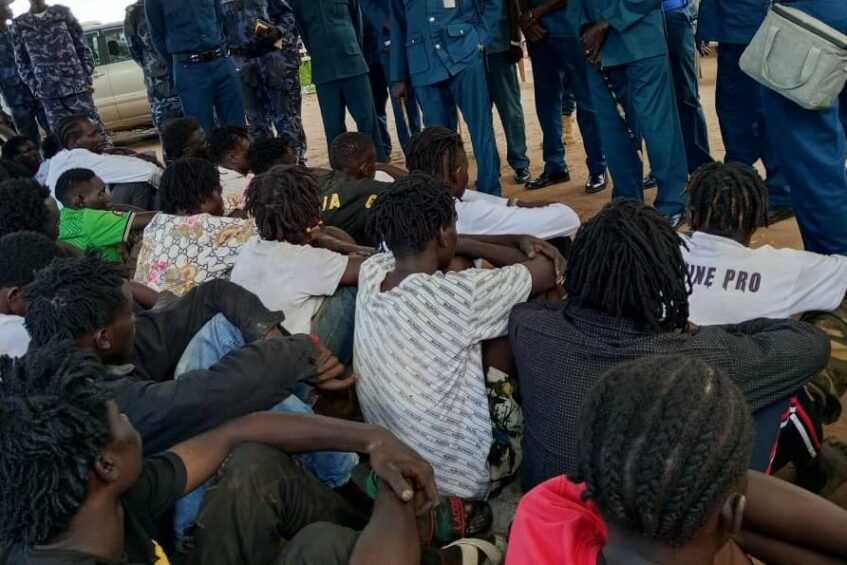
A group of young people arrested on accusations of criminal gangs association. (-)
An online Eye Radio survey shows majority of respondents linking people with dreadlocks to criminal activities as it recommends educating the public on challenging stereotypes associated with the lifestyle.
The three-week public opinion survey indicates that people with dreadlocks are likely to be discriminated against or associated with criminal activities.
The respondents answered questions about some common perceptions about young people with dreadlocks and how best such perceptions could be addressed.
A significant number of respondents in the survey recommend that education and media can change negative perception against people with locs, sometimes referred to as Rastafarians.
– The survey –
The survey has found a pervasive perception that young people with dreadlocks are often associated with criminal activities including theft, gang violence, drug use and anti-social behaviors.
Individuals with dreadlocks also face negative stereotypes and prejudice including assumption about their morality, professionalism and behavior – factors which are linked to unfair judgement and discrimination against them.
More than 70 percent of the respondents shared negative feedback about dreadlocks while 20 percent of them think the lifestyle has nothing to do with criminalities.
Out of 78 participants in the survey, 55 used derogatory terms to describe people with locs as “criminals, thieves, thugs, gang criminals, drug addicts, and niggas.”
Answering the question of whether or not people with dreadlocks are likely to be scrutinized by law enforcement agencies, 64.5 percent agreed, 15.8 percent disagreed while 19.7 percent are unsure.
Meanwhile, 75 percent said they have either experienced or witnessed incidents of people with dreadlocks being treated unfairly or linked with criminal gangs by security agencies, whereas 18 percent said they have not come across such situation.
Further, 61.8 percent of the respondents said they have come across situations in which people with dreadlocks were discriminated against in their professional or academic setting, while 31.6 percent said no.
Generally, the term ‘nigga’ – a corrupted spelling of the slang word ‘negro’ meaning black person, was used wrongly by the respondents to link youth groups and people with dreadlocks to crimes and drug abuse.
On a positive note, some respondents said perceive dreadlock as a sign of recognition particularly among musicians and celebrities.
However, it is important to note that these perceptions are subjective and may not reflect the reality of individuals with dreadlocks as a whole.
– Arrests in Juba –
Juba police have arrested hundreds of youths, mainly those with dreadlocks or uncombed hair, that were branded as “suspected criminals” during operations in different residential areas of the capital since November 19, 2023.
The detained youth included two artists, one of whom alleged that he was forced to shave his dreadlocks before being released.
Some members of the public, including celebrities, criticized the police operations that are alleged to have resulted in collective punishment.
But Police Spokesperson Major General Daniel Justin said the ongoing crackdowns are only intended to apprehend criminal gangs and not to wrongfully prosecute innocent people.
– Recommendations –
About 56 of the respondents recommend raising awareness to educate the public on ending the prejudice and misinterpretation that surrounds dreadlocks and criminality.
Several responses emphasize the importance of education and awareness in dispelling stereotypes.
Majority of the respondents think “education is a tool to open minds, shape thinking capacity, and correct negative perceptions.”
They called for the enlightenment of the public about dreadlocks – a cultural lifestyle embraced by people across all walks of life including teachers, musicians, and sportsmen may help change people’s attitudes towards people with dreadlocks.
Media literacy programs were cited as some of the ways to help individuals critically analyze and question stereotypes and biases based on perception instead of reality.
The respondents said challenging stereotypes in the media could make it possible to reshape public perceptions.
“The importance of positive role model representation in various fields is highlighted to counter negative stereotypes,” the survey recommended.
It further said community outreach programs and dialogues on lifestyle and beliefs are means to facilitate open conversations and discussions about stereotypes.
A significant number said engaging with law enforcement, educators, and the public can lead to better understanding and empathy.
Other areas of solution-oriented recommendations in the survey include legal rights and diversity, cultural sensitivity, and youth education.
According to 56 people who responded to the survey, educating individuals about their legal rights and protections against discrimination is crucial.
Such education is deeply rooted in empowering people and helping to address and challenge unfair treatment based on stereotypes.
The respondents collectively emphasize the multifaceted approach needed to challenge stereotypes and biases, saying that combining education, media influence, community engagement, legal awareness, and advocacy efforts can contribute to a more inclusive and equitable society.
Most respondents focused on solutions and singled out education as the tool to dispel stereotypes, acceptance of individual lifestyles, and the promotion of tolerance and respect for personal choices.
Read more: PERCEPTION SURVEY
Support Eye Radio, the first independent radio broadcaster of news, information & entertainment in South Sudan.
Make a monthly or a one off contribution.
Copyright 2024. All rights reserved. Eye Radio is a product of Eye Media Limited.